24 December 2015
William’s Contribution
by John Watson
with illustrations by Jonathan Kenning
Mr Jones’s farm was on the side of a beautiful hill overlooking a Welsh valley. Like many farms in that part of the world there were no crops but only animals and each morning Mr Jones and his wife would go out early to do their farming. The first job was to collect the eggs.
“Cluck, Cluck” said Lucy and Annie, the hens, as the eggs were taken away. They were always sorry to lose their eggs because it was so much work laying them; still, as they knew that they got regular meals in return they put up with it good humouredly. Anyway they had always lived on the farm and they knew that this was their contribution to it.
The ducks, Arthur and Edith were much more bad tempered and often tried to hide their eggs round the pond so that they wouldn’t be found. Often Mr and Mrs Jones had to hunt for a long time before they could find them but they always found them in the end, sometimes with the help of Shep the sheepdog who, being very clever, could always find everything. “Woof” would bark Shep when he saw the eggs. “Quack, quack” would protest Arthur and Edith but the eggs would still go into the basket so that Mrs Jones could take them to market.
After Mr and Mrs Jones had had breakfast there was more work to be done. The cows, Daisie and Meg had to be milked. They liked this because Mr Jones had the smartest sort of milking machine. It was much better than the ones used by the other farmers and made them feel the most important cows in the area. “Moo, moo” they would call out when it was time for milking.
There were other animals of course, helping the farm in their different ways. The sheep “Poppy and Pepper” gave Mr and Mrs Jones a beautiful woollen coat when they were sheared. That happened about twice a year. Poppy and Pepper would be rather cold after they had been sheared. “Baa, Baa” they would cry but luckily their wool would soon grow again so that they wouldn’t be cold for long. The farm had horses too, Peter and Paul, who pulled the cart for Mr and Mrs Jones and who could be lent out to help other farmers. They were a bit grander than the other animals and looked down their noses at them saying “Neeiigh, neeiigh” in most annoyingly superior way.
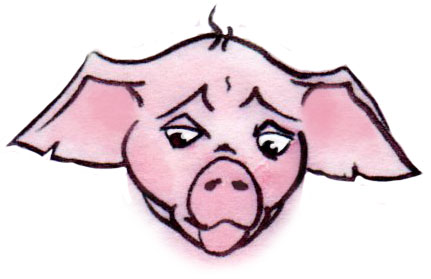 Each animal on the farm had its job. Even Kitty, the farm cat, spent her evenings out catching mice and rats which might otherwise have got into the food. Every animal, that is, with one exception. William, the little pig, didn’t really produce anything. Mr Jones had bought him because he had been told that pigs produce bacon and sausages but later he had discovered that they only produce them once they are dead and he was much too softhearted to let any of his animals be killed. So he kept William even though he didn’t really help the farm and, although he occasionally looked into the sty to see if William had laid any bacon or sausages, he was always disappointed.
Each animal on the farm had its job. Even Kitty, the farm cat, spent her evenings out catching mice and rats which might otherwise have got into the food. Every animal, that is, with one exception. William, the little pig, didn’t really produce anything. Mr Jones had bought him because he had been told that pigs produce bacon and sausages but later he had discovered that they only produce them once they are dead and he was much too softhearted to let any of his animals be killed. So he kept William even though he didn’t really help the farm and, although he occasionally looked into the sty to see if William had laid any bacon or sausages, he was always disappointed.
Still it upset William to think that he was not pulling his weight and, although the other animals were always nice to him, he worried that they might find him rather a burden and wondered if he should go away. Each day he saw Mrs Jones go to market with all the things the other animals had produced and gradually he got sadder and sadder.
Now one-day there was a fair on the field at the end of Mr Jones’s land. Mr and Mrs Jones were going of course and Mrs Jones had a feather in her hat which had been given to her by one of the farm geese. She wore a jacket made out of wool grown by Poppy and Pepper and in the picnic basket there were milk and butter produced by Daisy and Meg. Peter and Paul pulled the little cart in which Mr and Mrs Jones were riding and were wearing their smartest harness.
As the animals lined up to wave goodbye, William wished that he could have contributed something. He looked sadly over the side of his sty at the folk enjoying themselves further down the hill. He started to read the notices of the various competitions. “Strongest man” one said. He wished he could be a strong man and win it but he was only a little pig. “Most beautiful lady” said the next. William was a boy pig so he couldn’t enter for that one. But wait. The next one look better. “Bonny baby” it said.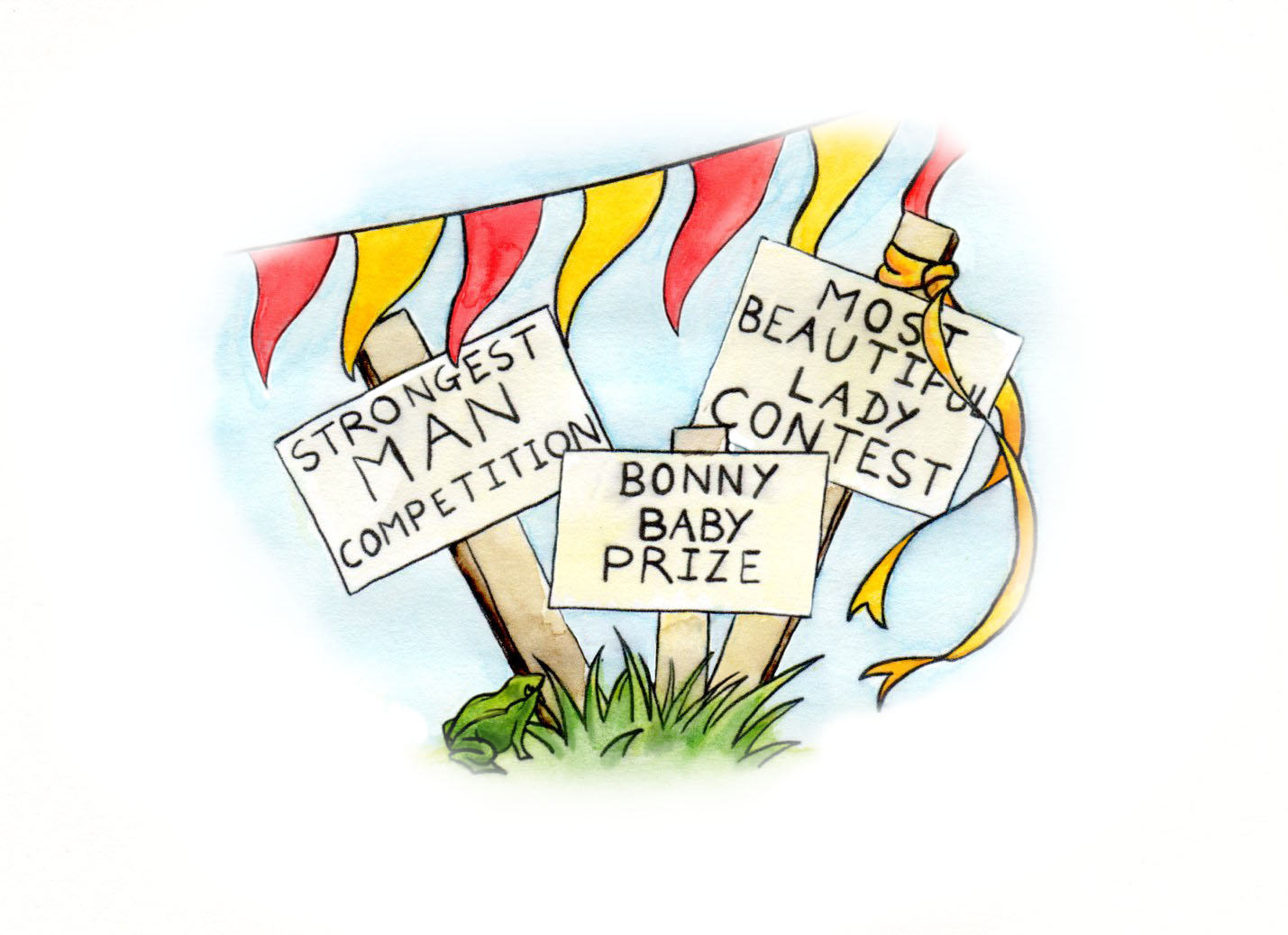
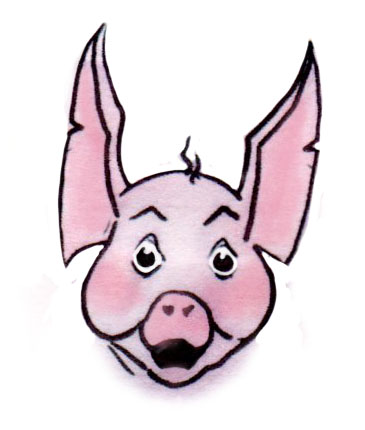 William was out of his sty as quick as a flash. He rushed into the farmhouse and stuck the end of the mop on his head. “Yes” it looked just like a baby’s hair. Then he grabbed a rug and pulled it round his shoulders. That look good too. He slipped under the fence and into the tent where he lay down among the babies.
William was out of his sty as quick as a flash. He rushed into the farmhouse and stuck the end of the mop on his head. “Yes” it looked just like a baby’s hair. Then he grabbed a rug and pulled it round his shoulders. That look good too. He slipped under the fence and into the tent where he lay down among the babies.
Now luckily for William the judges were very old and could not see properly so it was hard for them to tell if one baby was a bonnier than another and they decided to choose a nice plump one.
“Well,” said the chief judge, picking him up “this one is a good weight”.
“It looks a bit like a pig” said the second judge, who could see rather better.
“Splendid,” said the chief judge “I was called piggy, myself, at school”. He lent back so that everyone could appreciate his magnificent frame.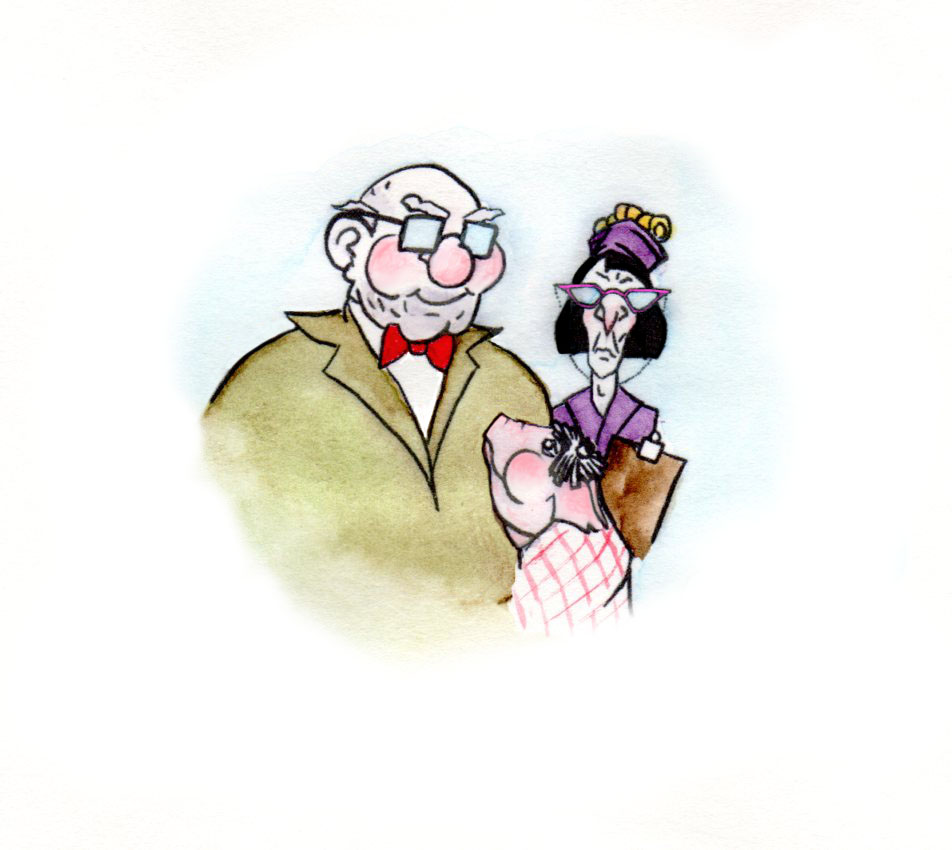
“It sounds a bit like a pig, too” said the second judge.
“Excellent, a true Welsh accent”, said the first. “Whose baby is this”. Mrs Jones stepped forward.
“Yes, a truly remarkable likeness,” said the judge, handing over a large cheque. It was a little hard on Mrs Jones who was actually very pretty but then the judge was very blind.
“Do you think we should return the cheque” Mrs Jones asked her husband that evening. He thought for a moment and then said in his slow sensible way:
“I don’t see why. The competition was for a Bonny baby and William is a very young pig. He was certainly bonnier that any of the human babies there.”
So they kept the cheque and spent some of the money on a party for the animals. William was much happier now. After all he had made a really useful contribution to the farm.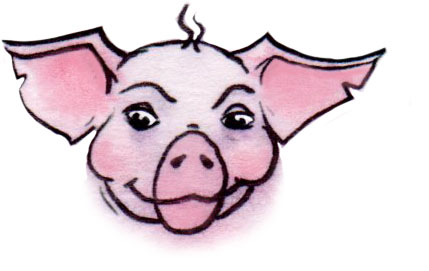
Text © John Watson 2015
Illustrations © Jonathan Kenning 2015

